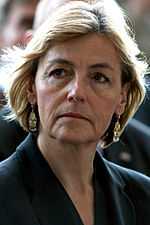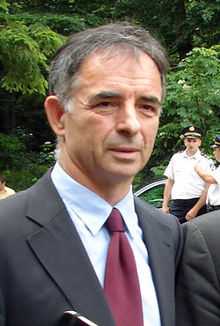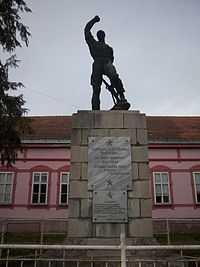Joint Council of Municipalities
|
official logo | |
|
Member municipalities in dark green | |
| Abbreviation | ZVO |
|---|---|
| Formation | 1997[1] (due to Erdut Agreement[2] from 1995) |
| Legal status | sui generis body formed on the basis of international agreement |
| Purpose | protection of interests of and rights of Serbs in Eastern Croatia |
| Headquarters | Vukovar[3][4] (regional office in Beli Manastir),[5] Croatia |
| Location | |
Region served | areas that were under the control of former Eastern Slavonia, Baranja and Western Syrmia |
Membership |
Trpinja Erdut Markušica Borovo Jagodnjak Negoslavci Šodolovci |
Official language | Croatian, Serbian |
President | Dragan Crnogorac[6] |
Secretary | Dragana Jeckov[7] |
Main organ | Council Assembly |
| Website |
Official site TV Production |
The Joint Council of Municipalities in Croatia (Croatian: Zajedničko vijeće općina; Serbian: Заједничко веће општина / Zajedničko veće opština or Заједничко вијеће општина / Zajedničko vijeće opština; shortly: ЗВО / ZVO) aligns interests of the Serb ethnic community in Eastern Slavonia, Baranja, and Western Syrmia in the Osijek-Baranja and Vukovar-Syrmia County. It coordinates initiatives and proposals to the institutions of government, international organisations and NGOs.[8][9][10] JCM is not an autonomous administrative unit. JCM is established on the basis of the Erdut Agreement.
History
Background

During the Croatian War of Independence, a self-proclaimed Serbian political entity SAO Eastern Slavonia, Baranja and Western Syrmia was formed. The region soon became part of the Republic of Serbian Krajina, another self-proclaimed region. After the Croatian army took control of the rest of the Republic of Serbian Krajina, the only area of Croatia that remained under Serbian control was Eastern Slavonia, Baranja and Western Syrmia.[11]
Local Serbs therefore concluded that without an agreement, they would face the same fate as those in the western part of Krajina. Meanwhile, Slobodan Milošević and Franjo Tuđman reached a consensus via the Dayton Agreement and on 12 November, the Erdut Agreement ended the war in eastern Croatia.[11] There was established transition period in which region was reintegrated with help of United Nations Transitional Administration for Eastern Slavonia, Baranja and Western Sirmium.
The Erdut agreement guarantees the Serbs "the highest level of internationally recognised human rights and fundamental freedoms". The Serb community was given the right to "appoint a joint Council of Municipalities".[11] The Council was established in 1997[1][12] The Council is one of the organisations that comprise the Serb National Council.[13][14]
Formation
The founding Charter was signed on 15 July 1997 at Osijek Airport in the presence of UNTAES Head Jacques Paul Klein. In early August the president of Committee for Civic, Human and Minority Rights, Branko Jurišić, complained to representatives of the European Union Monitoring Mission that the Council had not been registered in Zagreb although it had already begun to carry out most of the powers on the ground. This condition would last until the end of UNTAES mission in 1998.<[15]
2010 Croatian Parliamentary debate
Although the Erdut Agreement established the Council as a legal entity, its function was not clearly defined.[16] From the end of the war until 2010 the Council functioned as an association of municipalities. In this period, the Government was required to fund its work[17][18]), but the Council's legal position was below the level anticipated by the Croatian Government.[19] In 2010, Croatian parliament amended to the Constitutional Act on the Rights of National Minorities.[20] According to the proposal, the Council was to become a special administrative unit of Croatia that would be located in the territory of two counties.[21] The proposed article of the constitutional law was
In the area of Vukovar-Syrmia and Osijek-Baranja County, in accordance with the Basic Agreement on Eastern Slavonia, Baranja and Western Sirmium of 12 November 1995. (Erdut Agreement) and the Letter of Intent of the Croatian Government of 13 January 1997., operates the Joint Council of Municipalities as a legal entity.[21] Due to opposition from certain members of parliament, this part of bill was taken off the ballot.[20][21]
This decision provoked a heated Parliamentary debate. Opponents argued that this created a kind of local government with no parallel in the rest of the country. Milorad Pupovac, MP of the Serbian national minority condemned the MPs who were willing to recognise the full independence of Kosovo, while objecting to the autonomy of the local Serbian community.[22] President of the Independent Democratic Serbian Party Vojislav Stanimirović attacked MP Vesna Pusić (then-President of the National Committee for Monitoring Accession Negotiations with EU).[23]
At an emergency Council meeting the day after the constitutional changes, President Dragan Crnogorac condemned statements by Pusić, Ingrid Antičević Marinović, Josip Leko and Zoran Vinković.[24] He also said, We are not autonomists or separatists, we are legally elected representatives in local government and members of Council.[24] Pusić explained her attitude later in weekly Novosti where she said she believed that the Council should definitely exist but that it did not need constitutional protection.[21] Eventually a compromise was reached that the Council would receive preferred status, ensured by an ordinary, not constitutional law.[25]
JCM is the target of sharp criticism of Croatian right-wing groups. The Croatian Party of Rights[26] claims that the council represents a continuation and continuity of Eastern Slavonia, Baranja and Western Syrmia.[27]
Structure
The Council consists of an elected Council Assembly, the Commission for Election and Appointment, the Secretariat, the Office of the President and two Offices of Vice-Presidents who are the Vice-Presidents of the two counties.[3] Four committees are an integral part of the Council:[28]
- Committee for Civic, Human and Minority Rights
- Committee for Education, Culture and Sport
- Committee for Media, Information and Faith Issues
- Television Production Council
At least once every four months, the Council delegation meets with the President.[3][29]
The Council has established contacts with the Republic of Serbia.[31][32][33][34] The Council takes part in projects with the EU and the Ministry of Diaspora of Republic of Serbia.[5]
Council Assembly
The Assembly is made up of members of the Serbian ethnic community, regardless of their party affiliation. They are elected in ukovar-Sirmium and Osijek-Baranja counties. The members are determined as follows:[35]
The municipal councils in which the Serbian community makes majority, appointed 2 councillors.
The city councils in which Serbian community has a majority, appoints the following number of councillors:
- cities with population over 30,000- 6 councillors
- cities with population from 10,000 to 30,000- 4 councillors
- cities with population up to 10,000- 3 councillors
The municipal or city councils in which the Serbian community is a minority, appoint half these numbers.
Most members of Council Assembly of Joint Council of Municipalities are members of Independent Democratic Serb Party.
Officials
The third JCM President is Dragan Crnogorac from Independent Democratic Serb Party.
Independent Democratic Serb Party Non-party
| Order | Mandate | Portrait | President | Party | |
|---|---|---|---|---|---|
| 3 | 2005– |  |
Dragan Crnogorac | Independent Democratic Serb Party | |
| 2 | 2001–2005 |  |
Jovan Ajduković | Independent Democratic Serb Party | |
| 1 | 1997–2001 |  |
Miloš Vojnović | Independent Democratic Serb Party |
International relations
International guarantees of JCM took effect in 1996, following United Nations Security Council Resolution 1037. Over the years, JCM officials had formal meetings with foreign officials, including with former President of Serbia Boris Tadić,[36] US Ambassador in Zagreb,[37] and President of the Government of Vojvodina, Bojan Pajtić.[38]
Member municipalities
The municipalities part of the Council are: Trpinja, Erdut, Markušica, Borovo, Jagodnjak, Negoslavci and Šodolovci.[39] These municipalities are all located in Vukovar-Syrmia and Osijek-Baranja counties. Jagodnjak, Markušica, Šodolovci and Trpinja have a development index of less than 50% of the Croatian average,[40] among the poorest municipalities in Croatia. Borovo, Erdut and Negoslavci have an index of between 50–75%.[40] According to 2001 census, these municipalities had a population of 29,254 inhabitants and an area of 587.65 square kilometres, comparable with Isle of Man by territory and with Gibraltar by population. The Council's mandate extends to protecting the rights of all 60,500 Serbs who live in territory of the former Eastern Slavonia, Baranja and Western Syrmia.[41] The Joint Council of Municipalities is not a body of territorial autonomy although its mandate is territorially defined.[42]
Any municipality or town in these two counties where Serbs constitute a certain percentage of the population automatically participate in its work. However, no authority of municipalities was formally transferred to the Council. The municipalities also co-operate outside the Council in matters that are not within Council jurisdiction, such as joint appearances at fairs.[43][44]
Data by municipalities
| MUNICIPALITY | | | | | | | | TOTAL |
| Population in 2001 | 6 466[45] | 8 417[46] | 3 053[47] | 5 360[48] | 2 537[49] | 1 466[50] | 1 955[51] | 29 254 |
| Population in 2011 | 5 680[52] | 7 372[52] | 2 576[52] | 5 125[52] | 2 040[52] | 1 472[52] | 1 678[52] | 25 943 |
| Area | 123.87km2[45] | 158 km2[46] | 73.44 km2[47] | 28.13 km2[48] | 105km2[49] | 21.21km2[50] | 78 km2[51] | 587.65 km2 |
| number of settlements | 7[53] | 4[46] | 5 | 1 | 4[49] | 1 | 7[51] | 29 |
| number of educational institutions | 8 | 5 | 4 | 2 | 4 | 2 | 3 | 28 |
| municipality budget 2009[54] | $1,368,622.49[55] | 2,906,855.12$[56] | 859,169.32$[57] | 1,232,702.83$[58] | 1,365,005.90$[59] | 234,567.65$[60] | 468,740.54$[61] | 8,435,663.85$ |
-

Former Eastern Slavonia, Baranja and Western Syrmia and modern ZVO
-

ZVO on map of Croatia
-

UNTAES logo
-
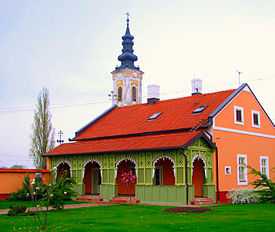
Patriarch's Palace of Eparchy of Osečko polje and Baranja
-
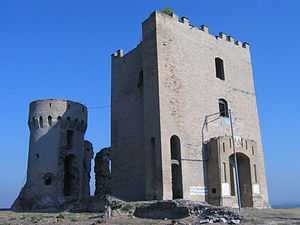
thumb|Remains of medieval Erdut Castle
-

Serbs in eastern Croatia in 2011
Education
On the territory of JCM members, in most public schools classes are given in separate Serbian and Croatian language classes. This practice is followed in Vukovar, Beli Manastir and villages inhabited by minority communities that are located outside member municipalities. No private schools operate in the area. Secondary schools are located in Dalj (High School Dalj) and Borovo (part of Vukovar high school). No institutions of higher education operate there. The majority of students attend University of Novi Sad, University of Osijek, University of Belgrade, University of Zagreb and University of Banja Luka. The Cultural and Scientific Center "Milutin Milanković" is located in Dalj. Committee for Education, Culture and Sport of Joint Council of Municipalities conducts activities aimed at fostering the Serbian language and Serbian Cyrillic alphabet, through preservation of memories of important individuals and events from the past of Serbian state and ethnic group.[62] Joint Council of Municipalities supports the registration of Serbian language public schools in which classes.
Special activities

JCM organises multiple cultural events: "Selu u pohode" (English: "Village Revisited"), "Međunarodni festival dečijeg folklora" (English: "International Festival of Child Folklore"), "Horsko duhovno veče" (English: "Choir Spiritual Night") and "Izložba likovnog stvaralaštva" (English: "The exhibition of fine art"). Veteran Football League brings together 10 soccer clubs. The Council sponsors Chess Leagues and a Shooting League. The Council also publishes a monthly magazine Izvor[3] (English: "Source") and, in co-operation with Radio Television of Serbia and Radio Television of Vojvodina, it broadcasts twice per month a TV show named "Hronika Slavonije, Baranje i zapadnog Srema" (English: "Chronicle of Slavonia, Baranja and Western Syrmia").[28] JCm collaborates with local minority media such as Radio Borovo, and has a 25% stake in Radio Dunav in Vukovar[63] and educational institutions such as Serbian Orthodox Secondary School.[64]
On 23 May 2011, JCM celebrated the "Day of the Joint Council of Municipalities". The day began by laying flowers on the grave of the first President of Council, Miloš Vojnović at a New cemetery in Vukovar.[65][66] After that, in the hotel "Lav", a ceremony took place. Council President Dragan Crnogorac stated:
From this important date (i.e. the date of the establishment), Joint Council of Municipalities, as an internationally recognised institution in Croatia, works on preserving of rights and interests of the Serbs, their cultural and educational autonomy, Serbian traditions, customs, language and Cyrillic alphabet, but also works on reconstruction, development, and improvement of the entire life of all citizens and because of this it is respected and stable partner of the government and of all entities that are committed to these values.[67]
See also
- Eastern Slavonia, Baranja and Western Srem
- Erdut Agreement
- United Nations Transitional Authority for Eastern Slavonia, Baranja and Western Sirmium
- Serbs of Croatia
- Serb National Council
- Veterans League of Joint Council of Municipalities
- List of local government organizations
- Francophone Association of Municipalities of Ontario
- Association of Serb municipalities (in Kosovo)
- Alliance of Serb municipalities (in Federation of Bosnia and Herzegovina)
Further reading
References
- ↑ 1.0 1.1 LogIT Internet Usluge – www.logit.hr – tel: 01/3773-062, 01/3773-063, 042/207-507. ":.: Radio Borovo :.:". Radio-borovo.hr.
- ↑ "Peace Agreements Digital Collection-Croatia-The Erdut Agreement, United States Institute of Peace" (PDF). Retrieved 27 April 2013.
- ↑ 3.0 3.1 3.2 3.3 Statut Zajedničkog vijeća općina, Vukovar, 2001.
- ↑ "Minority Rights Group International : Croatia : Minority Based & Advocacy Organizations". Minorityrights.org. Retrieved 27 April 2013.
- ↑ 5.0 5.1 "Snv – Vijesti – Zvo U Novu Godinu Učvršćen I Ojačan". Snv.hr. 30 December 2010.
- ↑ "Dragan Crnogorac: ZVO se ne sme ugasiti". Skd Prosvjeta.
- ↑ "Zajednicko vece opština Vukovar". Zvo.hr.
- ↑ "Zajednicko vece opština Vukovar". Zvo.hr. Retrieved 21 August 2011.
- ↑ "Follow-up seminar on the implementation of the first results of the monitoring of the Framework Convention for the Protection of National Minorities" (PDF). Retrieved 27 April 2013.
- ↑ "ANALYSIS of the access to housing care by refugees and displaced persons, former tenancy right holders, in the Republic of Croatia in 2007" (PDF). Retrieved 27 April 2013.
- ↑ 11.0 11.1 11.2 Caspersen, Nina (2003). "The Thorny Issue of Ethnic Autonomy in Croatia: Serb Leaders and Proposals for Autonomy" (PDF). London School of Economics and Political Science. Retrieved 27 April 2013.
- ↑ "Erdutski sporazum – Wikizvor" (in Croatian). Hr.wikisource.org.
- ↑ "SNV – Srpsko narodno vijeće". Snv.hr.
- ↑ United Nations High Commissioner for Refugees. "Minorities in Croatia" (PDF). UNHCR.
- ↑ C:\Users\Nikola\AppData\Local\Microsoft\Windows\Temporary Internet Files\Content.IE5\70VL778E\SS11_393_454_Baric.pdf
- ↑ "Usud Srpskog narodnog vijeća". Novossti.com. 20 August 2011.
- ↑ United Nations High Commissioner for Refugees (13 February 1998). "Refworld | Statement by the President of the Security Council [on "The situation in Croatia"]" (PDF). Unhcr.org.
- ↑ United Nations High Commissioner for Refugees (2 July 1998). "Refworld | Statement by the President of the Security Council [on "The situation in Croatia"]" (PDF). Unhcr.org.
- ↑ Odluka Vlade Republike Hrvatske o osnivanju zajedničkog vijeća općina, 15. listopad 1998., Zagreb
- ↑ 20.0 20.1 "Hrvatski sabor". Sabor.hr.
- ↑ 21.0 21.1 21.2 21.3 "Erdutski sporazum ne mora biti dobar temelj za mirnodopsku državu". Snv.hr.
- ↑ "Sabor uz potporu većine izglasovao ustavne promjene – Aktualno – hrvatska – Večernji list". Vecernji.hr.
- ↑ Srijeda 24. travnja 2013. 08:07h. "SDSS osudio govor Vesne Pusić u Saboru: To je tragedija – Sabor – Politika – Hrvatska". Dalje.com.
- ↑ 24.0 24.1 "Snv – Vijesti – Nismo Autonomaši Niti Separatisti". Snv.hr. 28 June 2010.
- ↑ Zlatko Crnčec (24 August 2010). "Srpsko vijeće općina u zakon, ali ne ustavni – Zadarski list". Zadarskilist.hr. Retrieved 21 August 2011.
- ↑ "HSP protiv Vijeća općina sa srpskom većinom – tportal.hr /vijesti/". Tportal.hr. 9 February 2010.
- ↑ "Braniteljski portal | ...Ne pitaj što domovina može učiniti za tebe, nego što ti možeš učiniti za Domovinu". Braniteljski-portal.hr.
- ↑ 28.0 28.1 "ZVO/odbori". Zvo.hr. Retrieved 21 August 2011.
- ↑ "Pismo hrvatske Vlade Vijeću sigurnosti UN o dovršenju mirne reintegracije" (PDF). Retrieved 27 April 2013.
- ↑ "Josipović o općem oprostu i srpskoj manjini – tportal.hr /vijesti/". Tportal.hr. 25 March 2011.
- ↑ "Info – Tadić meets with Serbs from region". B92.
- ↑ "Vlada Autonomne Pokrajine Vojvodine – Pajtić primio delegaciju Zajedničkog veća opština Vukovar". Vojvodina.gov.rs.
- ↑ "Pokrajina finansira srpske studente iz Hrvatske – Radio-televizija Vojvodine". Rtv.rs. 28 November 2011.
- ↑
- ↑ Statut Zajedničkog vijeća općina, članak 14.
- ↑ "Tadić se sastao s predstavnicima srpske manjine iz regije – Aktualno – svijet – Večernji list". Vecernji.hr.
- ↑ "Programs and Events | Embassy of the United States Zagreb, Croatia". Zagreb.usembassy.gov.
- ↑ "Vlada Autonomne Pokrajine Vojvodine". Vojvodina.gov.rs.
- ↑ "Novossti, 2011-06, Pokrajine". Novossti.com.
- ↑ 40.0 40.1 Zadra, odluka_o_razvrstavanju_jedinica_lokalne_i_podrucne_(regionalne)_samouprave_prema_stupnju_razvijenosti
- ↑ "Skdprosvjeta, 173". Skdprosvjeta.com.
- ↑ "SNV, erdutski-sporazum-ne-mora-biti-dobar-temelj-za-mirnodopsku-drzavu". Snv.hr.
- ↑ doxikus. "Zajednički nastup Općina na Novosadskom sajmu". Slideshare.net.
- ↑ "Kratak Izvještaj O Ostvarenoj Prezentaciji Općina Mikroregije, Borovo, Erdut, Jagodnjak, Markušica, Negoslavci I Trpinja". Porc.opcina-erdut.hr.
- ↑ 45.0 45.1 "vukovarsko-srijemska-zupanija, page 75". Vukovarsko-srijemska-zupanija.com.
- ↑ 46.0 46.1 46.2 "OBZ, tekst 30". Obz.hr.
- ↑ 47.0 47.1 "vukovarsko-srijemska-zupanija, page 64". Vukovarsko-srijemska-zupanija.com.
- ↑ 48.0 48.1 "vukovarsko-srijemska-zupanija, page 55". Vukovarsko-srijemska-zupanija.com.
- ↑ 49.0 49.1 49.2 "OBZ, tekst 34". Obz.hr.
- ↑ 50.0 50.1 "vukovarsko-srijemska-zupanija, page 65". Vukovarsko-srijemska-zupanija.com.
- ↑ 51.0 51.1 51.2 "OBZ, tekst 49". Obz.hr.
- ↑ 52.0 52.1 52.2 52.3 52.4 52.5 52.6 "DZS, popis, prvi rezultati 2011". Dzs.hr.
- ↑ http://www.trpinja.hr/index.php?option=com_content&view=article&id=1&Itemid=3
- ↑ "Današnji tečaj | pretvori KN – EUR | Exchance rate | convert EUR – Kn | vrijednost kune – eura | kurs | dolar | funta | franak". Marino-bobetic.iz.hr. 25 March 2011.
- ↑ Trpinja population
- ↑ Erdut population
- ↑ Markusica population
- ↑ Izvesca population
- ↑ Jagodnjak population
- ↑ Negoslavci population
- ↑ Sodolovci population
- ↑ "Zajednicko vece opština Vukovar". Zvo.hr.
- ↑ "www.radio-dunav.hr___dobrodošli". Radio-dunav.hr.
- ↑
- ↑ "Pokrajine". Novossti.com.
- ↑ LogIT Internet Usluge – www.logit.hr – tel: 01/3773-062, 01/3773-063, 042/207-507 (24 May 2011). ":.: Radio Borovo :.:". Radio-borovo.hr.
- ↑ "Snv – Vijesti – Međunarodno Priznata Institucija". Snv.hr.
| Wikimedia Commons has media related to Joint Council of Municipalities. |
External links
| ||||||||||||||||||||||||||||||||||||||||||||||||||||||||||


